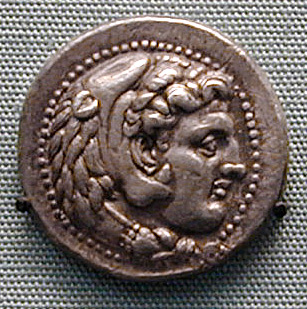
Hercules

Claimed by the Romans as their own under the name Hercules, Herakles is one of the oldest and most famous heroes of Greek mythology. His story, the richest of all the heroic myths, inspired a long tradition of painting, sculpture, and literary production. Born Alcides/Alcaeus in Thebes, he was a son of Zeus by Alcmene, the wife of Amphitryon (for a humorous retelling of his procreation see Plautus' Amphitruo). Zeus' wife Hera hated Herakles, causing him untold sufferings his entire life, from snakes at birth to the poisoned robe that brought about his death. He learned warrior skills, music, science, and ethics under expert teachers, among them Chiron and Rhadamanthus. Nothing, however, could tame his temper, which caused many undeserved deaths. His good deeds (e.g., the rescue for Admetus of his wife Alcestis from Hades) were offset by his fits of violence aimed at people dear to him (e.g., his own children).
The Delphic Oracle, at Hera's bidding, commanded him to serve King Eurystheus, his cousin, and undertake whatever tasks he commanded, " The 12 Labors." The Oracle promised him in return fame and immortality and advised him to change his name to Herakles, "the glory of Hera." Afterward, as a result of his attempt to steal Apollo's tripod at Delphi, the oracle sentenced him to three years of servitude to Omphale, queen of Lydia, who forced him to dress and behave as a woman. Undiminished, he went on to fight Laomedon at Troy, accompany Jason on the voyage of the Argo, and battle on the side of the gods against the giants.
Constantly engaged in warfare throughout the known world with his club, bow, and arrows, and wearing his lion skin as a badge of his enormous strength, Herakles wandered and fought his way through life. Saving his second wife, Deianira, from rape by the centaur Nessos, he provided the means of his own death, for Deianira, persuaded by the dying Nessos that his blood was a love potion, out of jealousy over reports of Iole's beauty, sent Herakles a robe soaked in it. The robe clung to his flesh, burning it and causing him such agonies that, unable to die, he ordered a funeral pyre to be built and lit for him. Zeus carried him to heaven as an immortal, where he lived with the gods, reconciled to Hera and married to her daughter Hebe.
The dissonance between Hercules' heroic physique and the puny neck of the Roman patron whom his Greek client flatters, fuels Umbricius' outraged disgust.
